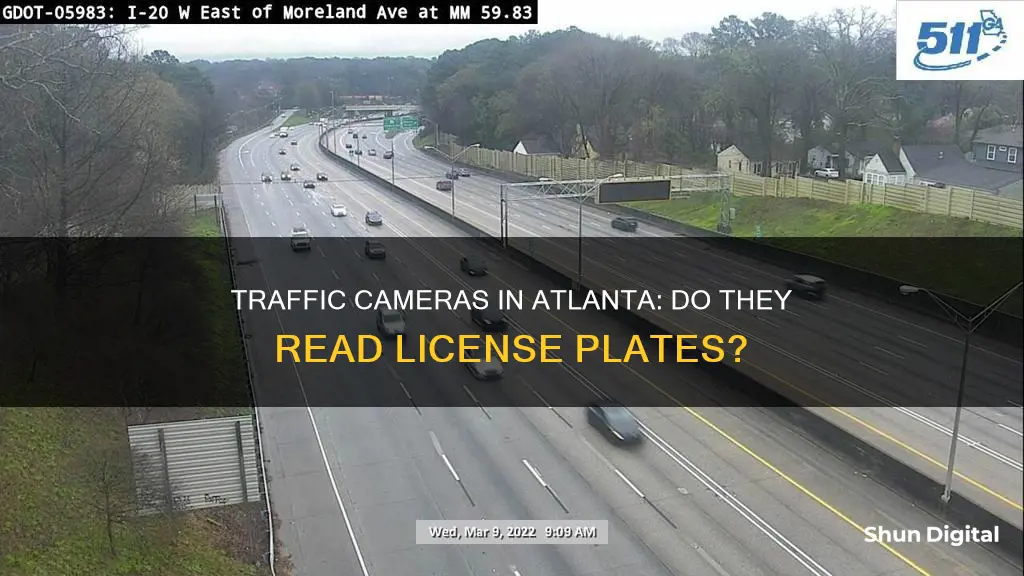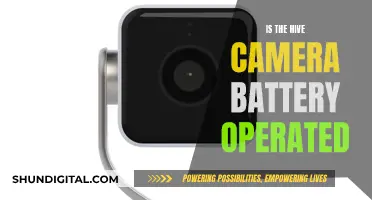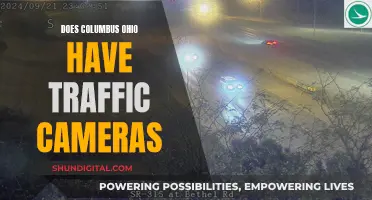
Atlanta's traffic cameras, also known as Automated License Plate Readers (ALPRs), are high-speed, computer-controlled camera systems that are typically mounted on street poles, streetlights, or attached to police squad cars. These cameras automatically capture license plate numbers, along with the location, date, and time, and the data is then uploaded to a central server. While these cameras can be useful for law enforcement in solving crimes and locating stolen vehicles, they have also raised concerns about privacy and the potential for misuse. The data collected by these cameras can reveal sensitive information about individuals' movements and personal lives, leading to concerns about mass surveillance and invasion of privacy.
What You'll Learn

Atlanta traffic cameras are used by law enforcement to scan popular intersections
In Atlanta, many police departments have adopted this technology to monitor popular intersections. For example, the Atlanta-based company Flock Safety has provided license plate reading cameras to over 100 neighborhoods, apartment complexes, and private landowners in the metropolitan area. The cameras have been successful in helping to solve crimes, with the company estimating that they help solve two crimes per day nationwide.
While these cameras can be a valuable tool for law enforcement, there are also concerns about privacy and the potential for misuse. The data collected by ALPRs can reveal intimate details about an individual's life, including their travel patterns and locations they frequent. There have been calls for clear regulations and policies to govern the use of this technology to protect the privacy rights of citizens.
Troubleshooting Snapchat Camera Focus Issues
You may want to see also

They are also used by private citizens and communities
Automatic license plate readers (ALPRs) are becoming more and more common across the United States. While they are often used by law enforcement agencies, they are also used by private citizens and communities.
In Atlanta, for example, private communities are leasing license-plate reading cameras to watch their streets and homes. Flock Safety, an Atlanta-based company, says about 100 neighborhoods, apartment complexes, or private landowners in metro Atlanta now have automatic readers. The solar-powered, motion-activated Flock system can tell how often every car comes into a subdivision and knows that some vehicles belong to residents. The data is automatically deleted after 30 days, but it can be downloaded and saved in that time.
In one case, a resident of the Sidestreet neighborhood, Jo McCoy, said she checks the footage from the camera every day, "just out of curiosity". She can see which cars enter and exit the community, and can even see a fox that crosses the street every now and then.
In another case, a Flock camera helped police in Sandy Springs arrest a man accused of stealing packages and mail from homes. The camera captured the suspect's license plate when he was in the area, and they later found him with eight credit cards with different names and 17 pieces of mail with assorted names.
While many residents and officials see the technology as an essential addition to the police’s crime-fighting toolkit, some are concerned about the privacy risk the cameras pose, and the potential for over-surveillance or misuse.
Peter Swire, a privacy expert and Georgia Tech professor, said:
> "These surveillance tools might protect public safety, but they also can give power to people to use it at their discretion — not necessarily for fair or good purposes. Solving crimes is good. Putting this video in the hands of busybody neighbors might not be so good."
Transferring Photos: Camera Chip to Computer
You may want to see also

They are used to monitor protests
Automated license plate readers (ALPRs) are high-speed, computer-controlled camera systems that are often mounted on street poles, streetlights, or highway overpasses. They are used to automatically capture all license plate numbers that come into view, along with location, date, and time data. While the primary purpose of ALPRs is to aid law enforcement, they have also been used to monitor protests and target specific communities.
In Atlanta, license plate readers have become commonplace, with private citizens, communities, and law enforcement all utilising the technology. While many see these cameras as essential for crime-fighting, there are valid concerns about privacy, over-surveillance, and misuse.
For instance, ALPR data can be used to track drivers who visit sensitive places such as protests or centres of religious worship. This information can then be shared with thousands of other law enforcement agencies. While this technology can help solve crimes, it also raises concerns about potential abuse and the chilling of First Amendment-protected activities.
The Atlanta-based company Flock Safety provides license plate reading cameras to about 100 neighbourhoods, apartment complexes, or private landowners in the metropolitan area. Flock Safety emphasises that individual communities own their footage and data, and it is automatically deleted after 30 days. However, this data could still be subject to court subpoenas, and communities can opt to share footage with the police during investigations.
The use of ALPRs by private citizens and communities in Atlanta highlights the increasing availability of surveillance data to individuals, raising questions about the balance between public safety and privacy rights. While these tools can deter and solve crimes, their potential for misuse or over-surveillance is a valid concern that requires careful consideration and oversight.
How to Ensure Your Camera Charges Efficiently While Switched Off
You may want to see also

They are used to automate toll collection
Automated license plate readers (ALPRs) are being used to automate toll collection. ALPRs are high-speed, computer-controlled camera systems that are mounted on street poles, streetlights, highway overpasses, mobile trailers, or attached to police squad cars. They are used to automate toll collection on pay-per-use roads. The cameras can be used for electronic toll collection, where they read license plates and collect tolls from drivers as they pass through the toll booth. This technology helps to streamline the toll collection process and improve efficiency.
ALPRs can also be used to monitor traffic flow and congestion in certain areas. This information can be used by transportation agencies to adjust toll rates dynamically and optimize traffic flow. The data collected by ALPRs can also help identify vehicles that are using toll roads without paying the required tolls. This information can then be used to issue citations or fines to the vehicle owners.
In addition to toll collection and traffic monitoring, ALPRs have a range of other applications. They can be used by law enforcement agencies to identify stolen vehicles, locate wanted individuals, and monitor for Amber Alerts. ALPRs can also be used for parking enforcement and revenue collection from individuals who are delinquent on taxes or fines. The technology is becoming increasingly common, with over two-thirds of US police departments using some form of ALPR.
Traffic Cameras in Linndale, Ohio: Legal or Not?
You may want to see also

They are used to monitor traffic
Automated license plate readers (ALPRs) are a form of technology that can be used to monitor traffic. ALPRs are high-speed, computer-controlled camera systems that are often mounted on street poles, streetlights, or highway overpasses. They can also be attached to police cars or other vehicles. These cameras automatically capture license plate numbers, along with the location, date, and time of each scan. The data collected by ALPRs can be used by police and other law enforcement agencies to monitor and manage traffic.
One way ALPRs are used for traffic monitoring is through fixed ALPR cameras mounted on traffic poles. These cameras can be used for red-light enforcement on the side of the road and for electronic toll collection on pay-per-use roads. They can also help with traffic management by cataloging the movements of vehicles, which can be useful for highway agencies. Additionally, ALPRs can be used to identify vehicles that are wanted in connection with a crime or are associated with an Amber Alert.
Mobile ALPRs, which are attached to vehicles, can also be used for traffic monitoring and management. For example, they can be used by law enforcement agencies to identify stolen vehicles or wanted individuals. Mobile ALPRs can also be used for revenue collection from individuals who are delinquent on city or state taxes or fines.
While ALPRs can be a valuable tool for monitoring and managing traffic, there are also privacy concerns associated with their use. Critics argue that ALPRs collect information on the movements of innocent motorists and that this data is often retained for extended periods without adequate privacy protections. It is important to strike a balance between the benefits of ALPR technology for traffic monitoring and the privacy rights of individuals.
Streamlining Logistics: Cameras to Computers
You may want to see also
Frequently asked questions
License plate readers, also known as automatic license plate readers (ALPRs), are high-speed, computer-controlled camera systems. They are typically mounted on street poles, streetlights, or police squad cars.
Yes, Atlanta traffic cameras are equipped with license plate readers. These readers scan every license plate that comes into view, recording the GPS location, date, and time. This information is then used to flag stolen cars or wanted individuals.
License plate readers use optical character recognition to read vehicle license plates. They can be used for various purposes, including law enforcement, asset recovery, and traffic monitoring.
Yes, there are privacy concerns related to the use of license plate readers. Critics argue that these devices collect personal information about individuals' whereabouts and can be used for mass surveillance. There is also a risk of misuse or over-surveillance by law enforcement or private citizens operating these devices.







